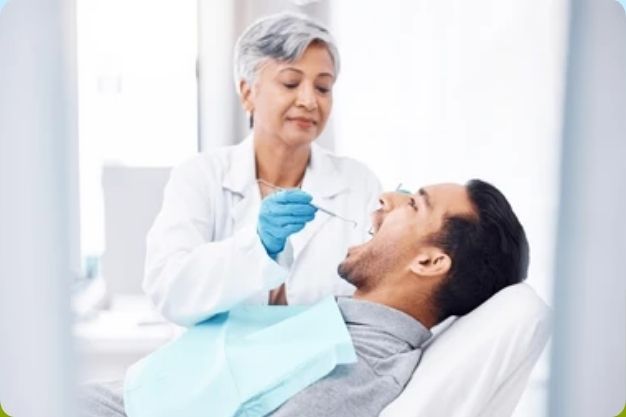
20 July 2025
Participating in sports of any kind is an incredible way to exercise, foster teamwork, and have a wonderful time. But, even during casual games of football, basketball, hockey, or even on a skateboard, injuries can happen, especially to your teeth.
A flying ball, a complete fall, or an unexpected tackle can transform your fun day into a dental emergency before you even finish saying, “Oh, no!” That’s why emergency dentistry in Carrollwood is so important, as it helps to protect your smile and save your teeth when injuries happen.
What is Emergency Dentistry?
Emergency dentistry is a unique branch of dental care that helps people deal with sudden tooth injuries, such as those that require urgent treatment or cannot wait until a regular dental visit. Injuries may involve:
- Knocking out a tooth.
- Chipping or breaking a tooth.
- Cracking or fracturing a tooth.
- Loosening or displacing a tooth.
- Cutting the lips, gums, or tongue with the teeth.
- Jaw pain or possible jaw injury.
- Trauma causes a severe toothache.
Dental injuries from sports happen more frequently than you may think, particularly among children, teens, and young adults.
Common Sports-Related Dental Injuries
Let’s have a close look at the types of injuries that athletes typically experience:
1. Knocked Out Tooth
This is also called an “avulsed” tooth. A knocked-out tooth is when a tooth comes completely out of its socket. If you act within 30-60 minutes, a dentist near you may be able to replant it, and hence time is important.
2. Cracked or Broken Tooth
In a blow to the face, a tooth may become cracked, chipped, or even broken in half. You may not feel anything right away. However, this injury can cause more serious problems later on if not treated.
3. Tooth Displacement
A blow can displace your tooth out of position, such as it may become pushed further into the gum or be partially pulled out. Displaced teeth are typically associated with bleeding and pain and require urgent treatment to save the tooth.
4. Soft Tissue Injuries
Cuts to the gums, cheeks, tongue or lips can be painful and may bleed freely. Some lacerations will heal on their own, and some cuts will need stitches or medical evaluation for infection risk.
5. Jaw Injuries
A direct hit can cause jaw pain, swelling and difficulty in opening or closing the mouth. Depending on the severity of the injury, this could indicate a fractured or dislocated jaw, which requires immediate dental emergency care.
First Aid Tips for Dental Emergencies
The time till reaching a dentist is critical; knowing what to do during the first few minutes when the injury has occurred can make a significant positive impact on the treatment of the affected area.
- For a knocked-out tooth: Pick it up by the crown (top), not the root. Rinse it gently in water and try to place it back in the socket. See a dentist right away and keep it in milk or saliva if that isn’t feasible.
- For broken or chipped teeth: Use warm water to rinse your mouth. Apply a cold compress to your cheek to lessen swelling. Save any pieces of the tooth.
- For soft tissue injuries: Rinse with salt water in such case and apply gauze to stop bleeding, or use ice packs to reduce swelling.
- For toothaches after trauma: Use cool compresses and rinse your mouth in such cases. Painkillers may burn the tissue if they are applied directly to the gums, and hence, avoid using them.
How to Prevent Sports-Related Dental Injuries?
Prevention is better than treatment. The good news? Most sports dental injuries can be avoided with the right protection.
1. Always Wear a Mouthguard
Mouthguards are your best defence against broken or knocked-out teeth. Regardless of whether it’s a customized product from your dentist or a store-bought one, a mouthguard is best to avoid any contact sport.
2. Use Helmets and Face Shields
Helmets that come with face guards, like those used in hockey, football, and baseball, provide added protection when playing that sport. Helmets help prevent jaw fractures and mitigate facial injuries.
3. Be Aware of Your Surroundings
When you play a sport, your alertness will prevent you from being hit or tripping over something. Talk to teammates to communicate and help remain focused on the game.
4. Visit the Dentist
Your dentist will take care of keeping your teeth strong and healthy with checkup visits. Your dentist will also have the opportunity to provide you with the most appropriate mouthguard for the sport and your dental condition.
When to See an Emergency Dentist?
Any damage, including, dental emergency after sports accident to your mouth or teeth, has to be treated seriously. If in the event of any of the below after a sports accident, seek emergency dental care at once:
- Severe pain
- Bleeding which does not stop
- Loose or avulsed teeth
- Swollen mouth or jaw
- Discomfort when you open or close your mouth
The sooner you seek help, the greater the opportunity of saving your smile.
Trust the Experts at Smile Venue Dental
When sports accidents happen, don’t panic, just act fast and trust the experts. At Smile Venue Dental, we’re here to protect your smile with quick, compassionate, and expert emergency dental care. Whether it’s a knocked-out tooth or a painful injury, our team is ready to get you back in the game with confidence.
Don’t let a sports injury bench your smile. Call Smile Venue Dental today and keep your winning grin in top shape!



